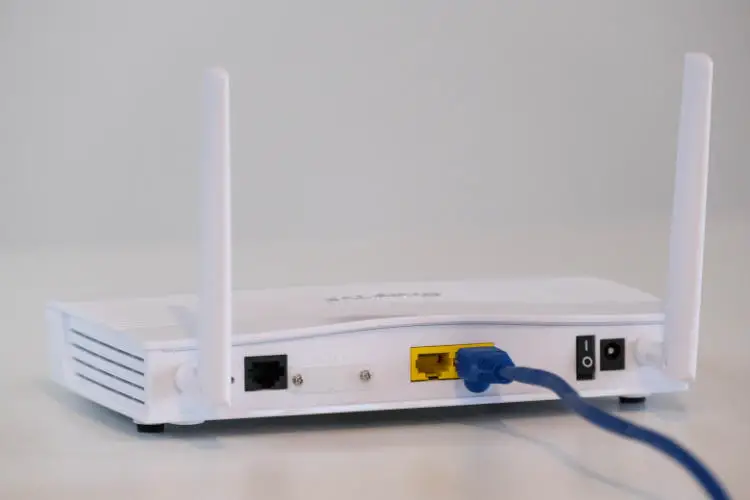Sometimes networking terms can get quite confusing, but knowing the difference between things like WiFi and a router doesn’t need to be all that complicated. As a cord cutter, it’s a great idea to arm yourself with as much technical knowledge as possible. Knowing as much as you can about equipment and lingo can make buying and installing equipment much easier.
The difference between WiFi and a router is that WiFi is a wireless network that you set up using a piece of hardware called a router. The router is the box that connects to your internet service provider and broadcasts a signal that you access as your WiFi network. They are related, but different.
So, for instance, if you get your internet service from your local cable TV company, you would connect your router to your cable modem (one of the boxes that the cable company gave you), and then your router could build your home WiFi network.
You could then connect your TV, computer, phones, and any other internet connected devices to this home WiFi network.
Just remember that your router lives in the physical world, most likely on your shelf somewhere, and your WiFi network lives in the “air” all around your house. When you turn off your modem, or the cable TV signal stops flowing to it, your WiFi network is no longer connected to the internet.
What’s a cable modem?
Why are we talking about modems now? Well, under almost all circumstances, a home network doesn’t happen without a modem. So, a quick overview of what modems are and how they work can be really helpful.
Your cable modem is the box that connects your incoming cable TV signal to your router. You’ll probably see a big coaxial cable connecting to your modem, which then will connect to your router through a CAT 5 network cable. That’s how the internet connects to your home WiFi network.
A modem is simply a box that converts a signal to something usable by your home networking hardware.
It’s typically a piece of hardware that you can rent from your cable provider; however, under most circumstances I recommend purchasing your own.
The technology behind modems is actually pretty interesting. Originally called a modulator-demodulator (that’s where “modem” comes from), “the goal is to produce a signal that can be transmitted easily and decoded reliably to reproduce the original digital data.” Wikipedia’s post on the modem is an interesting read if you’re into that kind of thing.
What if I don’t have a cable modem?
If you don’t get your internet service through your local cable company, then you might not have a cable modem at all.
However, regardless of which way you get your internet, you’ll almost always require a modem of some kind.
For instance, if you get your internet service through a satellite company, like Dish, you’ll still have a modem that takes the original signal and turns it into something useful that your router can build something with.
The same goes for DSL. If you’re working with DSL, such as with Verizon, you’ll still need a DSL modem to connect to your router and create your home network.
Does my WiFi network still work without my modem?
If your modem goes out, either because you lose power or the cable company signal goes down, your router will still work; however, it won’t be connected to the internet.
You may be thinking, doesn’t that mean that it isn’t working?
Actually, your connected devices will still talk to each other over your home WiFi network, so there are still some things that you’ll be able to accomplish without the internet.
For instance, if you run a Plex server to access your personal movie library, you should still be able to access your movies and TV shows temporarily until your internet connection comes back online.
Also, any files stored on your network will still be accessible to anyone connected to the same WiFi network.
While this doesn’t sound super useful for the most part, it does illustrate the difference between the connection to your router and the connection to your modem.
So, does my WiFi network still work without my router?
On the other hand, since your home WiFi network is built on your router, when it goes out, so does your home network. Even if your modem is functioning properly, if you lose your router, there is no connection at all.
In this sense, you can think of your router as your gateway to the internet as well. If that gateway is closed, you have no way of getting to the outside world. If your router goes down, you’re out of luck until you get it back online.
But I only have one box: The modem router combo
If you only have one piece of equipment, but your network is running just fine, you probably have a modem router combo.
A modem router combo is exactly what it sounds like, a modem and a router built into one case. The nice thing about these combo boxes is that you only need to find space for one device on the shelf or wherever you’re storing your networking equipment. Also, it only requires one electrical outlet.
Purchasing your own modem router combo box can be a great way to save money too.
Cable companies charge anywhere from 10 to 20 dollars a month for a rental modem, and sometimes even more for high end models.
Over time, those rental fees add up. And the cable company won’t stop charging you when you reach a certain threshold. So, you could end up spending hundreds of dollars on a device that becomes outdated.
How can I get online if my router goes out?
One way to get back online is to use your cell phone as a personal hotspot. As long as your phone has that functionality, you can create your own small WiFi hotspot, which is an actual WiFi home network, directly on your mobile device. This will allow you to reconnect temporarily until your router comes back up.
The speeds and stability of the WiFi generated by the hotspot on your phone will most likely not be as good as the one with your home router. And be very careful with what you do online while connected through your cellular network.
If you’re not on an unlimited data plan, you can burn through your data allotment very quickly by streaming videos and other bandwidth heavy activity while connected through your phone.
Some final WiFi and router tips
Keep your WiFi as secure as you possibly can.
- Set ultra secure passwords for your WiFi network and all of the devices on it
- Set up a secure guest network for visitors, friends, and family
- Make sure your router’s firmware is up to date
Place your router in a good location for optimal performance
We actually wrote an article about where to place your router in your home. Check it out for some great tips, such as how to position your router’s antennas and a lot more.
Where you put your router in your home can play a huge role in how well you stay connected to your network and how far away from your router you can be while online.
Update your router if it’s past its prime
In order to have the fastest speeds and safest security, you’ll want to keep your hardware updated on a reasonable schedule. It’s not necessary to go out and buy a new router every year just because the marketing says you need this new technology.
However, if you’re working with very outdated equipment, you might be missing out on some great features for cord cutters. And, you might be leaving security holes in your home network.
Let us know if you have any questions or suggestions in the comments below.




I plan to switch from ATT to Wow. I have 2 lap tops and 2 cell phones. Do I need to order a wifi? I use my computer only to use FB and emails. I don’t stream or play games. I just need the basics as I am retired and depend on fixed income.
Thank you.
Hi Geraldine,
The short answer is yes, you will always need a WiFi router if you want to connect laptops and cell phones that move around your house while you use them rather than having them plugged in by a cable and staying in one place. And cell phones can’t do this anyway…they will always need a WiFi network or else you’ll be using your data from your cell phone company. If you have unlimited data on your cell plan, that’s not a problem.
Often, the internet service provider (ISP) you choose, ATT or WOW!, will rent you whatever equipment you need. I’m pretty sure WOW! does this as well. If it’s easier for you to lease equipment from them and have them set it up for you, go for it. Just realize that you may end up spending a lot more over time if you lease it for years. That cost, however, may be worth it if you don’t know much about internet equipment or how to set it up.
For very basic usage, you don’t need super speeds and bells and whistles. If you want to buy your own, any new router made by a reputable company that you can pick up at a big box store or on Amazon should do the trick. You just need something basic that can offer you a good connection and lots of security. Have someone help you set it up if you’re not familiar with the process. It can be complicated.
Hope that helps!